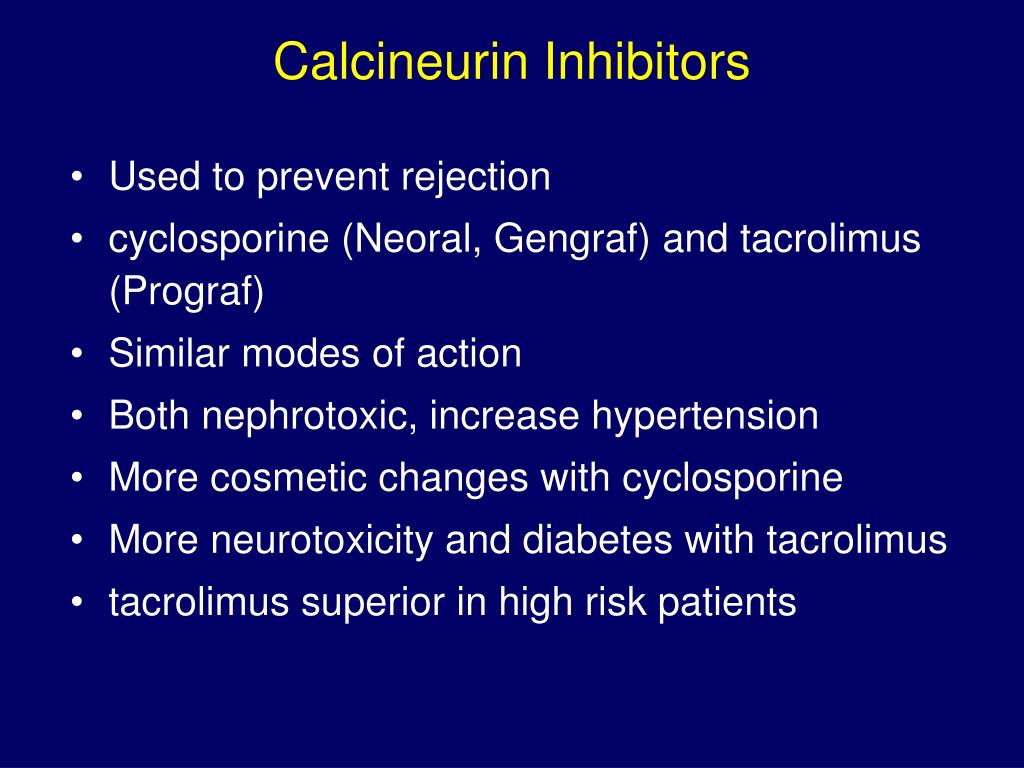Side effects and risks of the specific calcineurin inhibitor are described in the individual topics. The importance of this phosphatase is graphically illustrated.
However, this is usually transient and decreases over time (usually within one month).

Calcineurin inhibitor side effects. Burning, stinging, and pruritus (main side effects) application site reaction (erythema, skin discoloration) The considerable side effects that are associated with cnis therapy include arterial hypertension and nephrotoxicity. Side effects of calcineurin inhibitors.
3 the most common side effects experienced by people using elidel include skin burning, headache, colds, cough, flu, and viral infections. These side effects tend to lessen after several applications of the medication. If any of the following side effects do not go away or are severe, consult your doctor.
The more severe the eczema, the more likely the patient is to experience these side effects. 12 a kidney biopsy should be performed before starting and after completing a course of a calcineurin inhibitor because it may cause interstitial fibrosis. 4 although no causal relationship has been established, the united states food and drug administration (fda) has issued a black box warning that rare.
The most common side effects at the site of application are warm sensation (sometimes burning), stinging or itching of the skin. Calcineurin activates nuclear factor of activated t cell cytoplasmic (), a transcription factor, by dephosphorylating it. Two commonly prescribed calcineurin inhibitors are protopic and elidel.
Also, what are the side effects of calcineurin inhibitors? Finally, for many aspects of cni nephrotoxicity, there is now also increasing molecular evidence that the. Verkazia belongs to a class of drugs called ophthalmics, other;
Certain side effects of topical calcineurin inhibitor are common and may even disappear during treatment. Itchy skin where tci applied John feehally dm, frcp, in comprehensive clinical nephrology, 2019.
These symptoms generally disappear within a week of use. As a class of drug, the main concern is the effect of calcineurin on kidney function. These symptoms generally disappear within a week of use.
The focus of this article was to review the available literature on the pathophysiological mechanisms of cnis that induce chronic nephrotoxicity and. It has been in use since 1983 and is one of the most widely used immunosuppressive drugs. It is a cyclic fungal peptide, composed of 11 amino acids.
As the skin heals, this tends to disappear. Early uncontrolled studies using the calcineurin inhibitor (cni) cyclosporine suggested an initial benefit but a high relapse rate. What are the common side effects of calcineurin inhibitors?
What are side effects of calcineurin inhibitors? Topical calcineurin inhibitors (pimecrolimus, tacrolimus) may be used to treat inflammatory skin conditions such as atopic dermatitis when other treatments have failed. The most commonly reported side effect of topical calcineurin inhibitors is local skin irritation (burning, pruritus, and erythema) at the application site.
Cyclosporine may reduce proteinuria not only through its immunosuppressive effects but also by direct effects on the podocyte. What are the common side effects of calcineurin inhibitors? Other side effects include changes in skin colouration
Elidel is a type of drug known as a calcineurin inhibitor, which works by decreasing the inflammation that causes the red, irritated, and itchy skin of eczema. About 50% of patients develop some local skin irritation or a burning or itching sensation when these treatments are started, particularly with tacrolimus This is estimated to occur in half of all people using them.
It is not known if verkazia is safe and effective in children younger than 4 years of age. Suspected reasons for nephrotoxicity include: What are the possible side effects of verkazia?
If any of the following side effects do not go away or are severe, consult your doctor. It activates the t cells of the immune system and can be blocked by drugs. Renal calcineurin inhibitor (cni) toxicity is a frequent side effect of immunosuppression with cnis in solid organ transplantation, leading to acute and chronic renal failure.
This is estimated to occur in half of all people using them. Certain side effects of this medication are common and may even disappear during treatment. Pimecrolimus's side effects are numerous, as mentioned below:
According to the food and drug administration (fda): Burning or stinging when tci applied to the skin: Hives, difficulty breathing, swelling of your face, lips, tongue, or throat,
About 50% of patients develop some local skin irritation or a burning or itching sensation when these treatments are started, particularly with tacrolimus ointment. The most common side effects reported in children are: Specifically, these drugs help reduce inflammation caused by a specific type of immune cells called t cells, thereby decreasing eczema symptoms.
Most side effects from these medication are been mild and temporary. Calcineurin inhibitors (cni) are a family of three drugs (cyclosporine, tacrolimus, and pimecrolimus) that clinicians can use to suppress the immune system. Increased transforming growth factor beta 1, a cause of interstitial fibrosis.
A common side effect of topical calcineurin inhibitors is a burning and itching that goes away after the first few days of treatment. Tremors (an involuntary , rhythmic shaking movement in one or more parts of body) In general, the number and severity of adverse effects are related to the overall exposure, measured by length.
Oral and injectable calcineurin inhibitors (cyclosporine, tacrolimus) are used for both the induction and maintenance of postoperative immunosuppression. The most common side effects at the site of application are warm sensation (sometimes burning), stinging or itching of the skin. Verkazia may cause serious side effects including:
Like tacrolimus, ciclosporin (novartis' sandimmune) is a calcineurin inhibitor (cni). Side effects of this relatively new treatment.